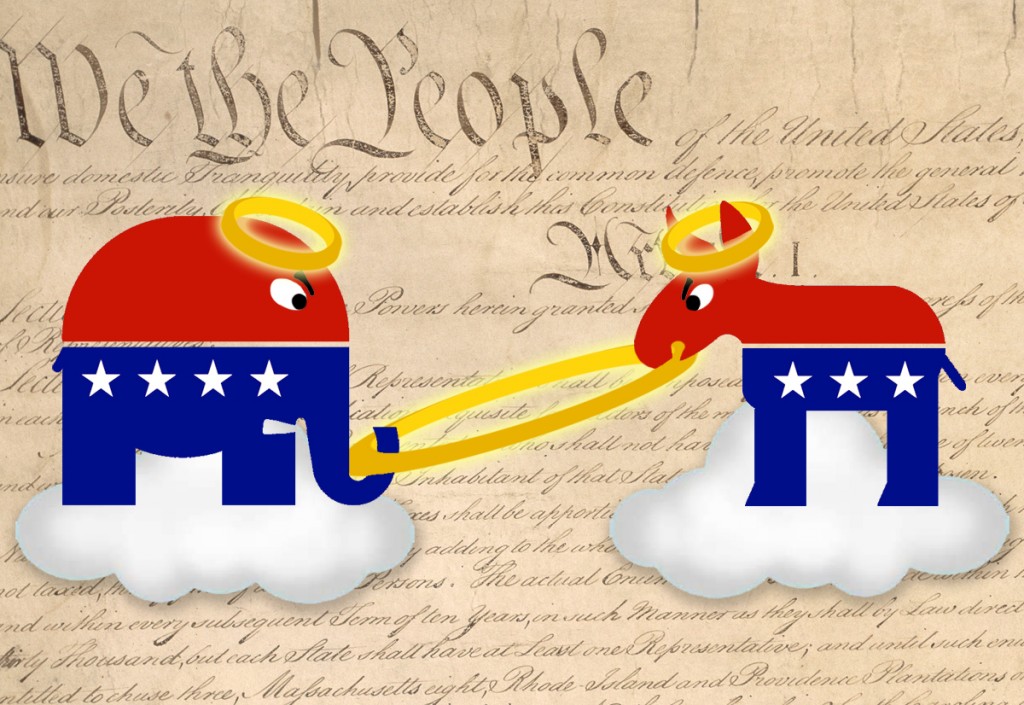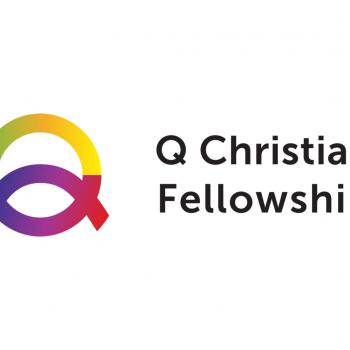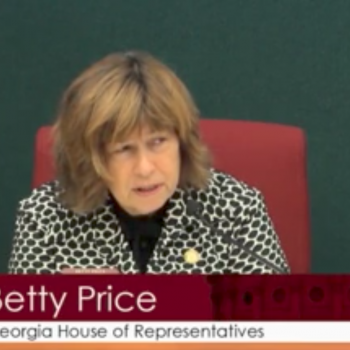As a married gay couple, it’s virtually impossible for us to avoid being pigeonholed when it comes to politics. People from all points on the political spectrum have assumed we’re progressive liberals (living in Portland only exacerbates the stereotype). We’ve had multiple interactions in which friends, assuming we share their same beliefs, have confessed to us their most intimate left-wing desires. These conversations typically devolve into awkward laughs and half-hearted nods.

Although David’s views are left-leaning, he’s effectively a centrist. Everything in balance. Constantino has similar views, but with enough of a libertarian streak to keep our conversations spicy. The point is, sexual orientation does not mandate a political affiliation. And neither does faith.
Early in the general election, Constantino was rebuked as “un-Christian” during a discussion in which he suggested Libertarian Gary Johnson was a candidate worth considering. What struck us as interesting, however, was not the criticism itself, but rather that it came from the Democratic camp. It was refreshing, for once, to see a liberal misappropriate God for his party.
We both grew up with the traditional Americanized belief that God is a Republican. It made sense based on everything people said about God: He favored the nuclear family and conservative mores. He was a lover of freedom and our nation’s ultimate defender. David grew up assuming he was a Republican because that was the side God was on (and no good Christian wants to be on God’s opposing team). Constantino wasn’t religious growing up, but he put Ronald Reagan, Margaret Thatcher, and John Paul II on a pedestal for the roles they played defeating communism—if the Vicar of Christ sides with the Right, he thought, surely the God he worships does as well.
When David was a young adult and re-engaged in his relationship with Christ, he began to wonder if God didn’t sound more like a Democrat: Jesus encouraged his flock to feed the poor, clothe the naked, and tend to the Earth. He was our shepherd and our loving protector. He welcomed the foreigner and the outcast, and made them part of the family. Constantino’s libertarianism had always advocated for these things, but to his own surprise, his conversion to Christianity has pulled him further left, making him more comfortable with government involvement in some of these areas. The thought has crossed his mind that God is, like him, a “lowercase” libertarian.
But any attempt to draft God into a political party or ideology is mere cherry-picking. To do it we must carefully select attributes of Him that we like and form them into the celestial identity that pleases us. Political leaders dumb God down into an easily understandable being who fits neatly within the framework of their party’s platform. That is why this campaign season has presented America with two (or three) very different concepts of God.
This presidential election is unique in that liberal Christians, historically a minority, are finally lashing out en masse against their conservative counterparts. It’s a monumental shift in our nation’s religious history. While Republicans have usually boasted of the moral high ground by opposing issues such as abortion and LGBT rights, their morally decrepit presidential candidate has ripped a hole in that narrative. But even though the right is crumbling, this election doesn’t bestow to the left the scepter of holy favor. Honest Republican, Democratic, and independent Christians alike are forced this year to look at one singular truth: God doesn’t back any candidate. He’s not in the business of doing so.
So how shall we approach political parties when we view them through the lens of Christ? Some will hold fast to the assertion that God is the supreme “law and order” ruler, and they’ll only support a party that reflects obedient, legalistic values. Others will say we can only champion a party that protects the poor and disenfranchised, and that anything else rejects the primary message of Christ. Moderate Christians—if there are any left—may humbly suggest to their polarized friends that God embodies attributes from both political parties, and that He is somewhere closer to the center of the spectrum.
What we’d like to propose is that God isn’t at any single point on the spectrum—he is the spectrum. He doesn’t have some attributes of justice and some of grace, he is fully justice, and fully grace. God is fully for tradition and for innovation. He is fully for the citizen and for the foreigner. He is fully for the good of the individual and for the good of the collective. God is fully for the protection of marginalized groups and for those whom society has privileged.
God Himself says he is the Alpha and the Omega, both the beginning and the end. The Bible exalts Christ as both the lion and the lamb. It’s not until we can accept the contradictions inherent in the fullness of God and come to peace with this cognitive dissonance that we can truly appreciate how petty and futile our attempts to categorize Him are. God belongs to no party, and his beliefs lie nowhere in-between. He is everything and all, and the very best attributes of every political party in existence are mere slivers of His all-encompassing goodness.
Our hope is that by releasing God from any political affiliation, we can better understand that He is not and never has been on our side alone. God is for everyone. We must nurture that belief in our minds and hearts, so that the next time we engage with the “other,” we will soften our tone, if not our content. Once we truly believe that God is for all human beings, we will resist the urge to categorize even our worst opponents as “other,” and instead embrace them as “brother.”
Like our Facebook page and follow us on Twitter for more.












